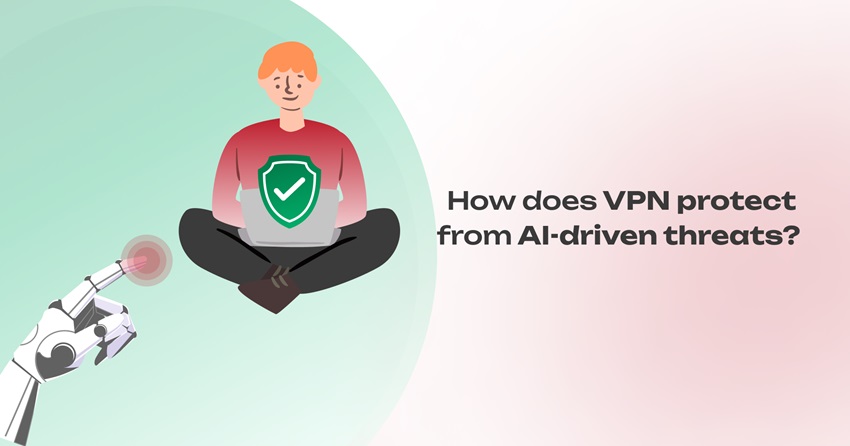
How VPN Protects from AI-driven Threats?
- August 13, 2024
- 8 minutes Read
- Security & Privacy
Artificial intelligence (AI) has not only improved our access to information in today’s digital landscape but also poses new cybersecurity challenges. Between 2022 and 2030, the AI market is expected to grow at a CAGR of 38.1%.
Virtual Private Networks (VPNs) have emerged as crucial tools for securing data and privacy from evolving AI-driven threats. It protects individuals and organizations from cyber threats by creating an encrypted connection between them and the Internet.
Let’s explore how VPNs protect against AI-driven threats in today’s digital world.
Table of contents
8 Ways VPN Secures You from AI-driven Threats
- Get Cutting-edge Encryption
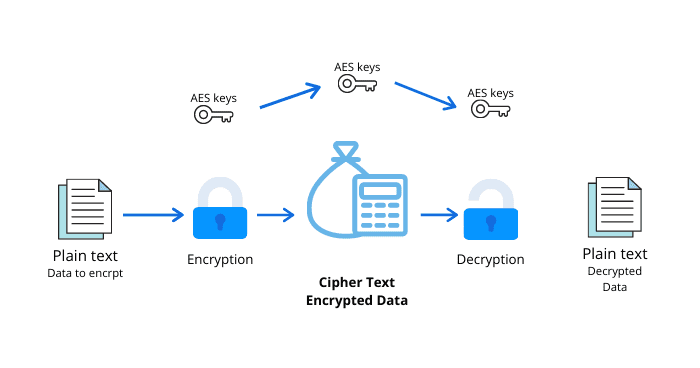
A robust VPN utilizes advanced encryption protocols like AES-256 to safeguard online activities. This military-grade encryption ensures that your data remains unreadable even if intercepted by hackers or AI-driven surveillance systems.
The VPN’s encryption acts as a formidable barrier. It protects your sensitive information from prying eyes and preserves your digital privacy.
- Secure all Data Transmission
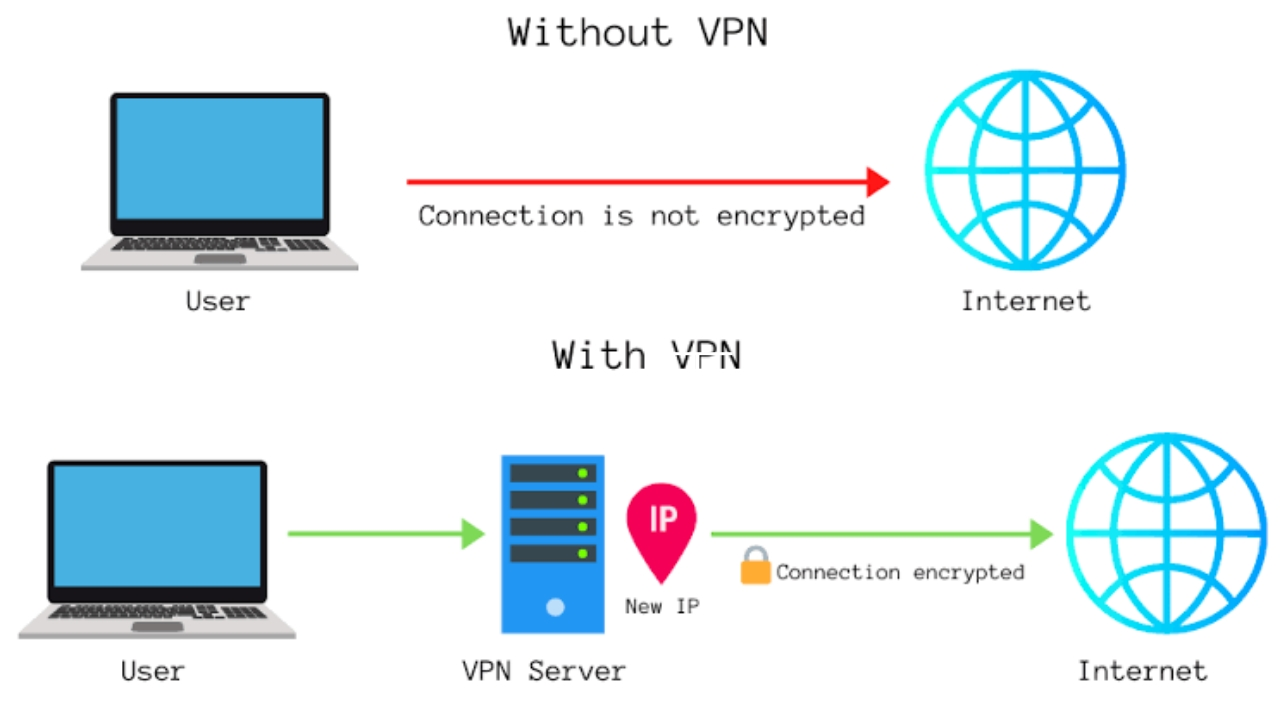
VPNs allow you to connect to the internet through encrypted tunnels. This prevents your internet service provider, government agencies, or AI-driven surveillance systems from monitoring your online activities.
The VPN’s secure protocols ensure your browsing history, downloads, and communications remain private and protected from unauthorized access.
This layer of protection is crucial in safeguarding your digital footprint from AI-driven threats that may seek to collect and exploit your personal information.
- Protect Against Eavesdropping

VPNs also shield you from AI-driven eavesdropping attacks. An encrypted tunnel routes your internet traffic to protect your online activity from AI systems.
Your login credentials, financial data, and private communications are protected from AI-powered malware or surveillance tools. Its robust encryption ensures that even if your data is intercepted, potential adversaries cannot read or use it.
- Hide Your Real IP Address
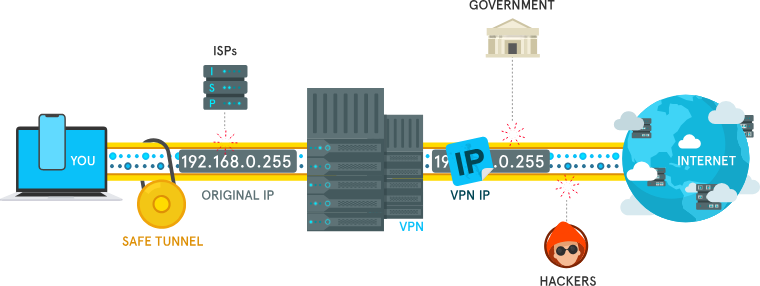
Additionally, A VPN hides your real IP address, making it difficult for AI-driven threats to identify your location or track your online activities.
Connecting to a VPN server replaces your IP address with one from the VPN’s network, effectively hiding your true identity and physical location. Evidently, a VPN protects you against geographically targeted attacks, and your digital footprint is hard to trace.
- Prevent Location Tracking
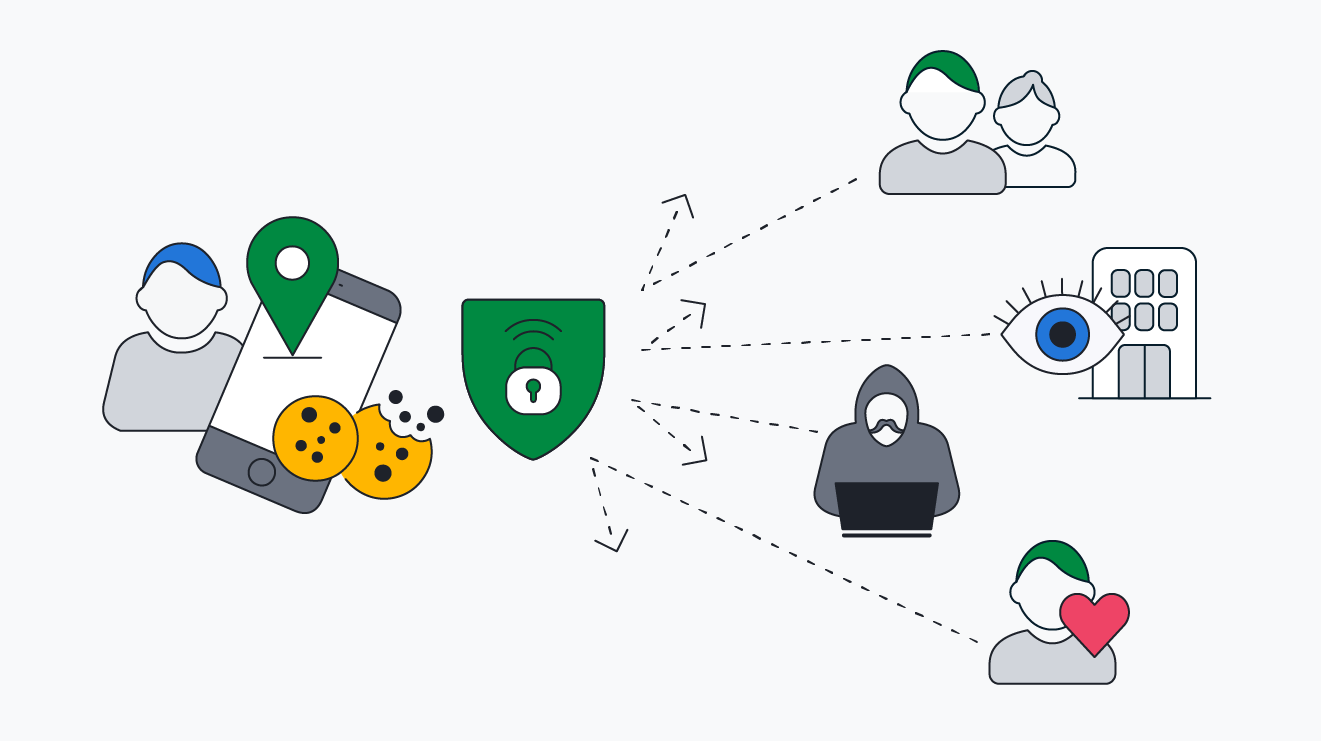
A VPN protects you from AI-driven location tracking by masking your real IP address and location. This makes it significantly harder for AI algorithms to pinpoint your whereabouts or monitor your movements, ensuring your physical privacy is maintained.
A VPN conceals your real identity and location, making it an effective defense against AI-driven surveillance and targeted attacks that exploit geographical information.
- Secure Network with Firewall

There are VPNs that incorporate a built-in firewall to enhance your online security further. This firewall acts as a layer of protection, monitoring and filtering your network traffic to detect and block any suspicious or malicious activity.
Coupling a VPN with a firewall provides comprehensive safeguards against AI-driven threats that can infiltrate networks and compromise devices.
This multi-layered security approach ensures your digital activities remain secure and your personal information is shielded from potential exploitation by AI-powered attacks.
- Block Unauthorized Access
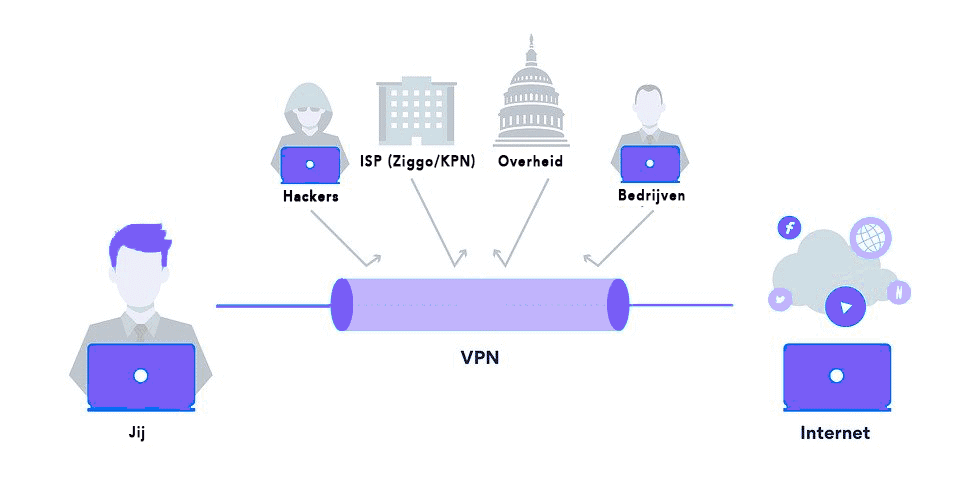
A VPN’s ability to block unauthorized access is crucial in safeguarding against AI-driven threats. By creating a secure, private network, a VPN prevents AI-powered malware or surveillance tools from infiltrating your device or network.
This ensures that your data and online activities remain shielded from prying eyes, reducing the risk of AI-powered adversaries harvesting and exploiting sensitive information. The VPN’s access control features are a robust defense against unauthorized intrusions, further strengthening your protection against AI-driven threats.
- Prevent Brute-force Attacks
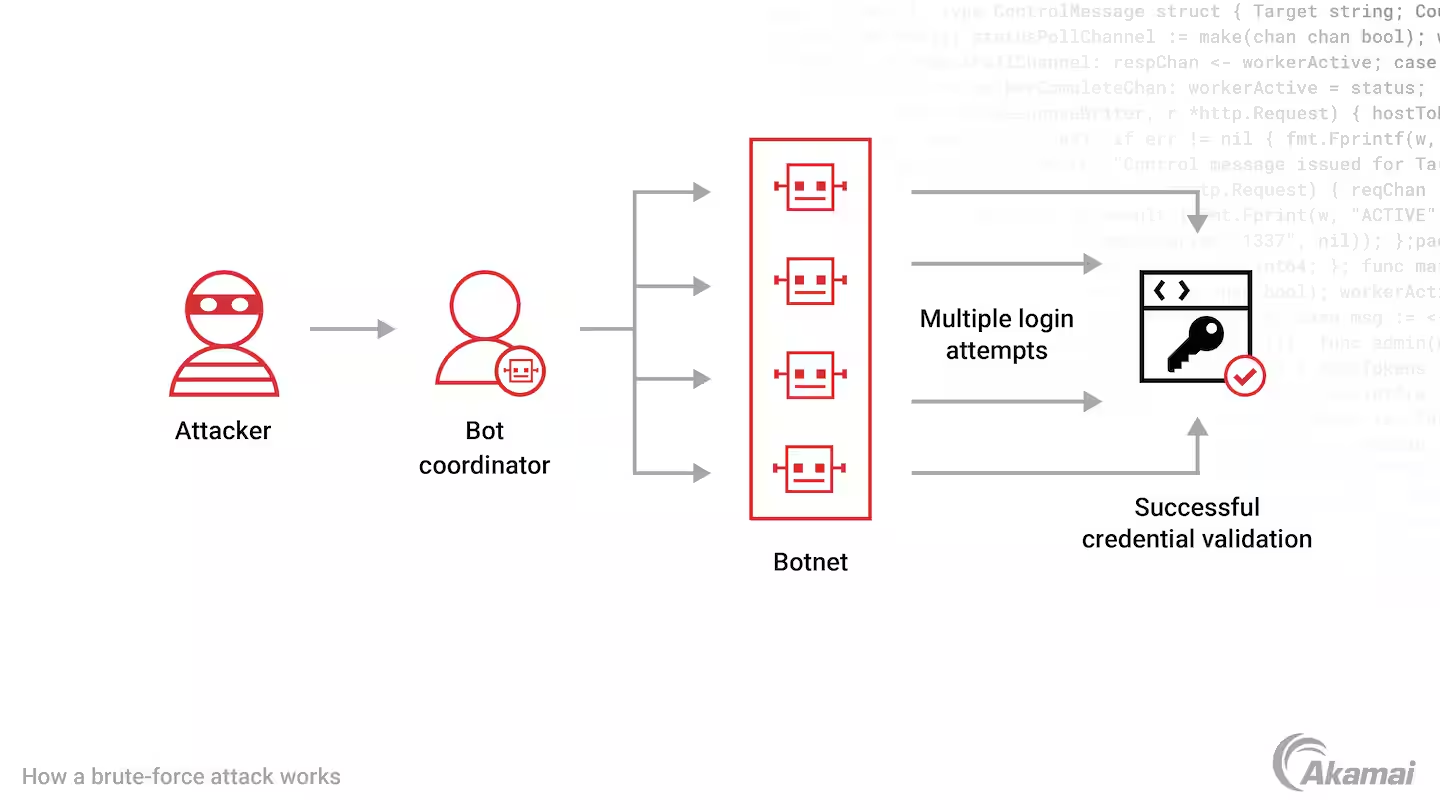
A VPN’s robust encryption and access control capabilities also safeguard against AI-powered brute-force attacks. Generally, these attacks rely on AI algorithms to systematically guess login credentials, but the VPN’s strong authentication measures make it exponentially more difficult for such attempts to succeed.
A VPN acts as a protective barrier by shielding your accounts and devices from unauthorized access. As a result, it significantly reduces the risk of AI-driven threats and prevents compromising sensitive information. Furthermore, it prevents these threats from gaining control of your digital assets.
Simple Brute Force
Brute-force attacks involve guessing passwords by systematically guessing log-in credentials or account passwords to gain unauthorized access to accounts or systems. In a simple brute-force attack, the attacker tries various combinations through trial and error until he finds the right one.
Dictionary Attacks
Dictionary attacks are brute force attacks where attackers systematically guess passwords using common words, phrases, or previously leaked passwords.
Hybrid Attacks
Hybrid attacks combine dictionary attacks with brute-force methods. In this way, they aim to guess passwords that mix common words with random characters, such as “NewYork1993”.
Reverse Brute Force
In a reverse brute force attack, the attacker starts with a known password and searches millions of usernames until a match is found. Previously, many people used leaked passwords when they were searching for passwords.
Credential Stuffing
If an attacker has a username-password combination that works for one website, they may try it on many others. For instance, users often reuse login credentials across multiple sites, and credential-stuffing attacks target this behavior pattern.
Specific AI-Driven Threats Mitigated by VPN
Here are some AI-driven threats that a VPN can help mitigate.
Data mining and Profiling: In the huge ocean of data available on the Internet, Artificial Intelligence algorithms are designed to create a comprehensive profile for an individual by studying their browsing habits, search history, and online activities.
A VPN cloaks your IP address and encrypts your internet traffic and makes it difficult for data miners to map your online behavior and accordingly create your online portrait.
Phishing and Spear Phishing Attacks: AI can be weaponized to craft phishing emails that are more likely to deceive users into divulging sensitive information.
Using a VPN can obscure your IP address and location, making it challenging for attackers to launch a location-specific or highly personalized phishing attack.
AI-powered Ad Targeting: Advertisers leverage AI to deliver hyper-targeted ads based on your online activities and location. However, a VPN can shield your location and browsing history to prevent targeted advertisements.
Man-in-the-Middle Attacks: In a man-in-the-middle attack, an attacker intercepts communications between two parties to steal or tamper with the data. AI can automate these attacks and make them sophisticated but difficult to detect. A VPN will encrypt your internet traffic, making it much harder for attackers to intercept and decipher your data.
Deep Packet Inspection (DPI): Advanced ISPs and attackers use artificial intelligence to examine the packets of your internet traffic and identify data patterns. A VPN encrypts your data so thoroughly that even DPI methods cannot access the contents of your communication.
Location-based Censorship and Restrictions: AI is often used to geo-restrict content or censure information in certain locations. A VPN will help mask your true location so you can access otherwise hidden or restricted content.
Benefits of Using a VPN for AI-Driven Threat Protection
Enhanced Privacy
VPNs create a secure, encrypted tunnel between a user’s device and the Internet. This is crucial for protecting sensitive data from cyber threats, particularly on public Wi-Fi networks.
Moreover, VPNs enhance online anonymity by masking the user’s IP address, thereby making it harder for third parties to track user activities. What’s more, AI-enhanced VPNs can further improve security by implementing advanced obfuscation techniques and dynamic IP address allocation
Improved Security
Real-time AI network traffic analysis can identify and block suspicious activities before they become attacks. Integrating AI can enhance security by monitoring encrypted traffic for anomalies. AI systems can automate incident response workflows, allowing efficient and coordinated responses to security threats.
Optimization & Improved UX
By analyzing network conditions in real-time, AI-driven VPNs can automatically connect users to the fastest and most secure servers, enhancing performance and reducing latency. Adapting VPN protocols to individual users ensures that users can meet their security needs without compromising performance and security.
FAQs
Can A VPN Prevent AI-driven Malware Attacks?
Yes, a VPN can block AI-driven malware. It encrypts your data and prevents malicious actors from intercepting and injecting malware into your network traffic.
How VPN Protects Against AI-Powered Phishing?
A VPN enhances security by hiding your IP address and encrypting your data. Thus making it harder for AI-driven phishing tools to target and deceive you.
How does a VPN help in mitigating AI-driven DDoS attacks?
A VPN protects your network from AI-driven DDoS attacks by masking your IP address. It mitigates DDoS by distributing the network traffic across multiple servers.
Final Words
Integrating AI technology with VPNs allows users to enhance privacy, improve security, and optimize performance to protect against cyber threats.
VPNs and AI together offer an effective defense strategy in the era of AI advancements. Thus, a VPN can protect you against all kinds of AI-driven threats.





